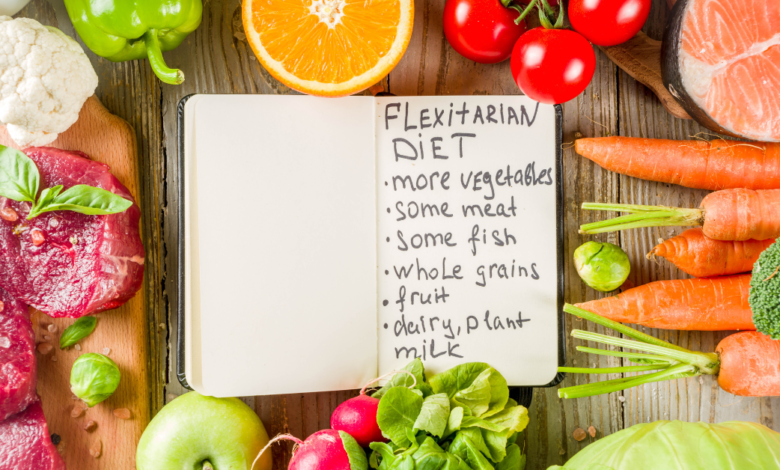The Ultimate Beginner’s Guide to the Flexitarian Diet: Your Path to a Healthier and More Sustainable Lifestyle

The term “Flexitarian” is a combination of the words “flexible” and “vegetarian,” reflecting the diet’s adaptable nature. The core principle of the Flexitarian Diet is to focus on plant-based foods like fruits, vegetables, whole grains, legumes, nuts, and seeds, while still allowing for small portions of animal-based proteins when desired.
This balanced approach provides the benefits of a plant-rich diet, such as increased fiber, antioxidants, and essential nutrients, while also offering the flexibility to enjoy a wider range of foods. The Flexitarian Diet is designed to be a sustainable and enjoyable way of eating that can be tailored to individual preferences and lifestyle needs.
Benefits
The Flexitarian Diet offers a wide range of potential benefits for your health, the environment, and your overall well-being. Here are some of the key advantages of adopting a Flexitarian lifestyle:
- Improved Health: The emphasis on plant-based foods in the Flexitarian Diet can lead to reduced risk of chronic diseases, such as heart disease, type 2 diabetes, and certain types of cancer. The diet is also associated with lower blood pressure, better weight management, and improved gut health.
- Weight Management: The Flexitarian Diet’s focus on nutrient-dense, high-fiber foods can support healthy weight loss and maintenance. By incorporating more plant-based options and limiting the consumption of highly processed, calorie-dense foods, you can achieve a balanced and sustainable approach to weight management.
- Environmental Sustainability: Compared to diets that rely heavily on animal-based products, the Flexitarian Diet has a lower environmental impact. Reducing your consumption of meat, dairy, and other animal-based foods can help lower your carbon footprint, conserve natural resources, and support more sustainable food production practices.
- Increased Variety and Flexibility: The Flexitarian Diet allows you to enjoy a wide range of foods, including occasional animal-based proteins. This flexibility can make the diet more accessible and enjoyable, as you can still indulge in your favorite dishes while reaping the benefits of a predominantly plant-based approach.
- Improved Nutrient Intake: By emphasizing whole, minimally processed plant-based foods, the Flexitarian Diet can help you meet your daily needs for essential vitamins, minerals, and antioxidants. This can lead to enhanced energy, better immune function, and overall improved well-being.
Flexitarian Diet vs. Other Diets
The Flexitarian way of eating stands out from other popular diets in several key ways:
| Diet | Approach | Flexibility |
|---|---|---|
| Flexitarian | Primarily plant-based with occasional animal-based foods | High flexibility to adjust intake based on personal preferences and needs |
| Vegetarian | Excludes all animal-based foods, including meat, poultry, and fish | Moderate flexibility, as some vegetarians may consume dairy and/or eggs |
| Vegan | Excludes all animal-based foods, including meat, poultry, fish, dairy, and eggs | Low flexibility, as vegans strictly avoid all animal-derived products |
| Paleo | Focuses on whole, unprocessed foods that were available to our hunter-gatherer ancestors | Moderate flexibility, as Paleo allows for the consumption of certain animal-based proteins |
| Mediterranean | Emphasizes plant-based foods, such as fruits, vegetables, whole grains, and olive oil, with moderate amounts of fish and poultry | Moderate flexibility, as the Mediterranean diet includes some animal-based foods |
The Flexitarian Diet’s balance of plant-based and occasional animal-based foods, combined with its high degree of flexibility, makes it a unique and versatile approach to healthy eating.
The Flexitarian Food Pyramid
The Flexitarian Food Pyramid provides a visual guide to the recommended food groups and their proportions within the Flexitarian Diet. This pyramid can help you understand the optimal balance of foods to incorporate into your daily meals.

At the base of the pyramid, you’ll find a wide range of plant-based foods, including:
- Fruits and vegetables
- Whole grains
- Legumes, nuts, and seeds
These nutrient-dense, high-fiber foods should make up the majority of your daily intake.
Moving up the pyramid, you’ll find smaller portions of:
- Dairy products (such as low-fat or non-fat milk, yogurt, and cheese)
- Eggs
- Poultry and fish
At the very top of the pyramid, you’ll find small amounts of red meat and processed meats, which should be consumed sparingly.
By following the Flexitarian Food Pyramid, you can ensure that your diet is balanced, diverse, and focused on whole, minimally processed foods that support your overall health and well-being.
How to Start
Transitioning to a Flexitarian lifestyle can be a gradual process, allowing you to make sustainable changes that fit your personal preferences and lifestyle. Here are some steps to help you get started:
- Increase Plant-Based Foods: Begin by gradually increasing the proportion of plant-based foods in your diet, such as fruits, vegetables, whole grains, legumes, nuts, and seeds. Aim to make these foods the foundation of your meals.
- Limit Processed and Red Meats: Reduce your consumption of processed meats, such as deli meats, sausages, and bacon, as well as red meats like beef, pork, and lamb. Instead, opt for leaner protein sources like poultry, fish, and plant-based alternatives.
- Experiment with Meatless Meals: Incorporate more meatless meals into your weekly routine, such as vegetarian or vegan dishes. This can help you explore new plant-based recipes and discover foods you enjoy.
- Pay Attention to Portion Sizes: When you do consume animal-based proteins, be mindful of your portions. Aim for smaller servings, such as 3-4 ounces of meat, poultry, or fish per meal.
- Embrace Variety: Explore a wide range of plant-based foods, including different types of fruits, vegetables, whole grains, legumes, nuts, and seeds. This will help you maintain a diverse and nutrient-rich diet.
- Plan and Prepare: Meal planning and preparation can be key to success on the Flexitarian Diet. Set aside time each week to plan your meals, grocery shop, and prepare healthy, plant-based dishes in advance.
- Stay Hydrated: Drink plenty of water throughout the day to support your overall health and well-being.
Remember, the Flexitarian Diet is a flexible approach, so feel free to adjust the pace and focus based on your individual needs and preferences. The goal is to make gradual, sustainable changes that you can maintain in the long run.
Also read: Transform Your Life: Discover How to Live a Healthy Lifestyle Today!
Tips for Success in Implementing Flexitarian Lifestyle
To help you thrive on the Flexitarian Diet, consider these tips:
- Embrace Variety: Experiment with a wide range of plant-based foods, including different types of fruits, vegetables, whole grains, legumes, nuts, and seeds. This will ensure you get a diverse array of nutrients and prevent boredom.
- Meal Prep: Set aside time each week to plan and prepare your meals. This can help you stay on track, save time, and ensure you have healthy, Flexitarian-friendly options readily available.
- Explore New Recipes: Seek out Flexitarian-friendly recipes that inspire you and introduce you to new flavors and cooking techniques. This can make the transition to a plant-based diet more enjoyable and sustainable.
- Listen to Your Body: Pay attention to how different foods make you feel. Adjust your Flexitarian approach as needed to find the balance that works best for your individual health and well-being.
- Stay Hydrated: Drink plenty of water throughout the day to support your overall health and well-being.
- Seek Support: Connect with others who are following the Flexitarian Diet, either in person or through online communities. Sharing experiences, recipes, and tips can be invaluable.
- Be Flexible and Forgiving: Remember that the Flexitarian Diet is a flexible approach. If you occasionally indulge in non-plant-based foods, don’t be too hard on yourself. Simply refocus and continue your Flexitarian journey.
By incorporating these tips into your daily routine, you can set yourself up for long-term success on the Flexitarian Diet.
Flexitarian Recipes and Meal Ideas
The Flexitarian Diet offers a wide range of delicious and nutritious meal options. Here are some examples to inspire you:
Breakfast
- Overnight oats with berries, nuts, and a sprinkle of cinnamon
- Scrambled tofu with sautéed vegetables and whole-grain toast
- Greek yogurt parfait with granola and fresh fruit
Lunch
- Quinoa and roasted vegetable salad with grilled chicken or tofu
- Lentil and sweet potato soup with a side of whole-grain crackers
- Veggie-packed burrito bowl with black beans, brown rice, and avocado
Dinner
- Grilled salmon with roasted Brussels sprouts and wild rice
- Vegetable stir-fry with tofu and brown rice noodles
- Lentil and mushroom bolognese over whole-wheat pasta
Snacks
- Hummus with carrot and cucumber sticks
- Apple slices with almond butter
- Mixed nuts and dried fruit
Remember, the Flexitarian Diet is all about finding a balance that works for you. Feel free to experiment with different combinations of plant-based and occasional animal-based foods to create meals that are both nutritious and enjoyable.
Flexitarian Lifestyle for Weight Loss
The Flexitarian Diet can be an effective approach for sustainable weight loss and management. Here’s how it can support your weight-loss goals:
- Focus on Nutrient-Dense Foods: The Flexitarian Diet emphasizes whole, minimally processed plant-based foods that are rich in fiber, vitamins, and minerals. These nutrient-dense options can help you feel fuller on fewer calories, making it easier to manage your overall calorie intake.
- Manage Portion Sizes: When you do include animal-based proteins, the Flexitarian Diet encourages you to be mindful of your portion sizes. Smaller servings of meat, poultry, and fish can help you maintain a calorie-controlled diet.
- Increase Fiber and Hydration: The emphasis on plant-based foods in the Flexitarian Diet means you’ll be consuming more fiber, which can promote feelings of fullness and support healthy digestion. Staying hydrated can also aid in weight management.
- Enjoy a Flexible Approach: The Flexitarian Diet’s flexibility allows you to indulge in occasional treats or non-plant-based foods without feeling deprived. This can make the diet more sustainable in the long run, preventing the rebound weight gain that can occur with more restrictive diets.
- Boost Metabolic Health: The Flexitarian Diet’s focus on whole, nutrient-dense foods can help improve metabolic markers, such as blood sugar control and cholesterol levels, which are important for long-term weight management.
Remember, sustainable weight loss is about more than just the number on the scale. The Flexitarian Diet can support your overall health and well-being while helping you achieve your weight-loss goals.
Flexitarian Lifestyle for Sustainability
The Flexitarian Diet is not only beneficial for your health but also for the health of the planet. By adopting a more plant-based approach with occasional animal-based foods, you can reduce your environmental impact and contribute to a more sustainable food system. Here’s how the Flexitarian Diet supports sustainability:
- Lower Carbon Footprint: The production of plant-based foods, such as fruits, vegetables, and grains, generally has a lower carbon footprint compared to the production of animal-based foods. By reducing your consumption of meat, dairy, and other animal-based products, you can help mitigate your contribution to greenhouse gas emissions.
- Water Conservation: The Flexitarian Diet’s emphasis on plant-based foods requires less water for production compared to animal-based foods. This can help preserve precious water resources, especially in regions facing water scarcity.
- Land Use Efficiency: Growing plant-based foods is generally more land-efficient than raising livestock. By shifting towards a more plant-based diet, you can help reduce the demand for land used for animal agriculture, which can contribute to deforestation and habitat loss.
- Waste Reduction: The Flexitarian Diet’s focus on minimally processed, whole foods can help reduce food waste, as these foods are less likely to spoil or be discarded compared to highly processed, packaged items.
- Support for Sustainable Agriculture: By choosing plant-based and locally sourced foods, you can support farmers and producers who are implementing sustainable agricultural practices, such as regenerative farming, organic cultivation, and crop diversification.
By embracing the Flexitarian Diet, you can not only improve your personal health but also contribute to a more sustainable food system for the benefit of the planet and future generations.
Flexitarian Diet for Health and Wellness
The Flexitarian Diet is not only a flexible and sustainable approach to eating, but it also offers numerous health benefits. By focusing on nutrient-dense, plant-based foods, the Flexitarian Diet can support various aspects of your overall well-being:
- Chronic Disease Prevention: The Flexitarian Diet’s emphasis on fruits, vegetables, whole grains, and other plant-based foods is associated with a reduced risk of chronic conditions like heart disease, type 2 diabetes, and certain types of cancer.
- Improved Gut Health: The high fiber content of the Flexitarian Diet can promote a healthy gut microbiome, supporting digestive function, nutrient absorption, and immune system health.
- Enhanced Mental Well-being: The Flexitarian Diet’s nutrient-rich foods, such as omega-3-rich foods and antioxidant-packed produce, may contribute to improved cognitive function, mood, and overall mental health.
- Increased Energy and Vitality: The balanced, plant-based approach of the Flexitarian Diet can provide steady, sustained energy levels throughout the day, helping you feel more vibrant and energized.
- Stronger Immune Function: The vitamins, minerals, and phytochemicals found in plant-based foods can support a robust immune system, potentially reducing the risk of infections and illnesses.
- Healthy Aging: The nutrient density and anti-inflammatory properties of the Flexitarian Diet may contribute to healthy aging, potentially slowing the progression of age-related conditions and promoting longevity.
By incorporating the Flexitarian Diet into your lifestyle, you can take proactive steps towards improving your overall health and well-being, empowering you to live your best life.
Common Myths and Misconceptions about the Flexitarian Diet
As with any dietary approach, there are some common myths and misconceptions surrounding the Flexitarian Diet. Let’s address a few of them:
- Myth: The Flexitarian Diet is just a “fad” diet. Reality: The Flexitarian Diet is not a temporary fad, but rather a sustainable, flexible, and science-backed approach to eating that can be maintained long-term.
- Myth: The Flexitarian Diet is too restrictive. Reality: The Flexitarian Diet is designed to be flexible, allowing you to enjoy a wide range of foods, including occasional animal-based proteins. This makes it a more accessible and sustainable option compared to strict vegetarian or vegan diets.
- Myth: You can’t get enough protein on the Flexitarian Diet. Reality: The Flexitarian Diet emphasizes plant-based protein sources, such as legumes, nuts, seeds, and whole grains, which can provide adequate protein when combined with smaller portions of animal-based proteins.
- Myth: The Flexitarian Diet is too time-consuming and difficult to follow. Reality: While the Flexitarian Diet encourages the consumption of whole, minimally processed foods, it can be as simple or as complex as you choose. With proper planning and preparation, the Flexitarian Diet can be easily incorporated into your daily routine.
- Myth: The Flexitarian Diet is not suitable for everyone. Reality: The Flexitarian Diet is a highly adaptable approach that can be tailored to individual preferences, dietary needs, and health goals. With its emphasis on flexibility, the Flexitarian Diet can be a viable option for a wide range of people.
By understanding and debunking these common myths, you can approach the Flexitarian Diet with confidence and clarity, empowering you to make informed decisions about your health and well-being.
Whether your goal is to improve your health, support environmental sustainability, or simply explore a more diverse and nutritious way of eating, the Flexitarian Diet provides a versatile framework to guide your journey. By incorporating the principles and tips outlined in this guide, you can embark on a path towards a healthier, more sustainable lifestyle.
Ready to start your Flexitarian journey? Our proposed meal plan and recipes will guide to get started today!




